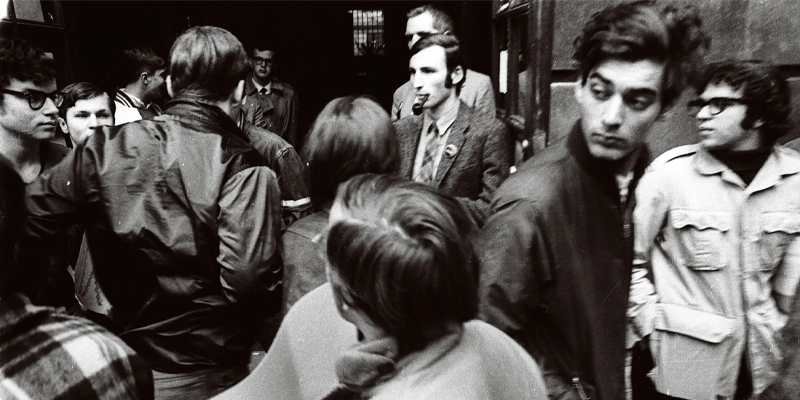“Crazy with the poison of Vietnam in my lungs.” Paul Auster on the ’68 Columbia protests.
Auster second from the right, in a photo by Jerry Upham
from the collection of Paul Cronin and re-printed in Vanity Fair
As police, administrators, politicians, and outsiders attack college protesters in a wave of reactionary repression, I am reminded of the role the recently-passed novelist Paul Auster played in the anti-Vietnam War protests at Columbia University.
Auster’s participation is briefly documented in a Vanity Fair oral history of the ’68 campus takeover, and he appears in photos and film from the uprising. Auster also recounted his experience in a 2008 op-ed for The New York Times on the fortieth anniversary of the day students first occupied the Columbia campus.
“The Accidental Rebel” recounts how “a quiet, bookish young man,” who had protested against the Vietnam War but “was not an active member of any political organization on campus,” found himself inspired to join in protest with his fellow students in April 1968:
I went because I was crazy, crazy with the poison of Vietnam in my lungs, and the many hundreds of students who gathered around the sundial in the center of campus that afternoon were not there to protest the construction of the gym so much as to vent their craziness, to lash out at something, anything, and since we were all students at Columbia, why not throw bricks at Columbia, since it was engaged in lucrative research projects for military contractors and thus was contributing to the war effort in Vietnam?
Auster was part of the group that briefly shut down construction on a new gym (a major goal for Black student protesters, who sought to resist Columbia’s further expansion into Harlem), and then moved to take control of buildings on campus later that day. Auster was in Mathematics Hall for the weeklong campus occupation.
When the administration called in the police, Auster was among the students arrested by the NYPD: “I was arrested & pulled by my hair to the police van by one officer as another officer stomped on my hand with his boot,” he writes. Then, as today, reactionaries like the police resorted to brutality and violence in response to student demands and protests.
In his 2008 op-ed, Auster explicitly resisted drawing a parallel between his story and the then-current protest movement against the Iraq War. Still, it’s hard to read Auster’s account of how a budding author became a part of history and not hear it rhyme with today.
How many generations of students have been told that they are the future and are offered an open hand to go forth and change the world? And how many generations have instead found their attempts to change the world met with a closed fist?
The 1968 Columbia occupation is now seen as an historic moment in the American anti-war movement, and Auster was proud to count himself as a participant. But he also concluded that the protest at Columbia wasn’t substantial enough—the student actions that day were merely “symbolic” but “not empty gestures.”
Auster’s contemporaries disagreed, and wrote to The Times to correct his assessment:
…I must respectfully disagree with his assertion that the 1968 protests at Columbia University accomplished ‘not much of anything.’
The Vietnam War would have continued much longer than seven years without the tidal wave of antiwar sentiment to which the Morningside Park protest contributed enormous energy and momentum. Would that we could accomplish as much today.





